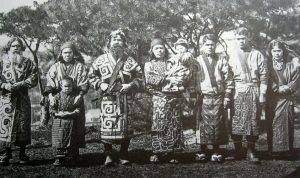Three Reasons the Ainu Language is Important
By Sarah-Claire Jordan
 Ainu is the language of an indigenous group in Japan of the same name. They were the original inhabitants of the island of Hokkaido as well as a handful of other small islands. The Ainu people are discriminated against in Japan, making it difficult to know exactly how many remain today as they can be reluctant to identify themselves as such. Those who have identified themselves as Ainu continue to live in the same areas that their ancestors lived in.
Ainu is the language of an indigenous group in Japan of the same name. They were the original inhabitants of the island of Hokkaido as well as a handful of other small islands. The Ainu people are discriminated against in Japan, making it difficult to know exactly how many remain today as they can be reluctant to identify themselves as such. Those who have identified themselves as Ainu continue to live in the same areas that their ancestors lived in.
The language of the Ainu people is difficult to research, since there are practically no written records of it from the past. However, it is important that we try to learn as much as we can about Ainu for these three reasons:
- The Ainu language is endangered
Ainu has been considered an endangered language since before 1960. Though the Ainu people still exist and live in Japan, most of them don’t speak Ainu anymore and have completely switched over to Japanese. About ten native speakers of Ainu are still alive today, and they are all very old. There are some people who speak some Ainu and who are a bit younger, but overall, those people who carry on the linguistic tradition won’t be around for very much longer. Since all the native speakers are so advanced in age, we can conclude that Ainu is not being passed on to new generations, or not successfully at least. When a language gets to that stage where it isn’t being learned by new generations, it’s on its way to its deathbed.
- Japanese was influenced greatly by the Ainu language
You could go so far as to say that Japanese would not be what it is today if it weren’t for the Ainu language. Many suffixes and place names in Japanese come directly from Ainu, like the name of the city Sapporo, which means “dry area” in the Ainu language. Many of the names of places that are in Ainu remain in Ainu, while other Ainu words have been borrowed and altered to fit better into the Japanese vocabulary. Given that Ainu was the language of the land in Hokkaido and some nearby areas up until about the 1800s, there’s not doubt that Japanese was influenced by it.
- Some of the greatest oral literature in Japan is in Ainu
Though there aren’t any written records of the Ainu language in the past, the Ainu themselves have a rich tradition of oral literature that goes above and beyond simple storytelling. Some of the most epic stories are known as “yukar” and are sagas that tell the story of worlds that floated in the clouds, including a description of the human world as being on the back of a fish that was the cause of earthquakes. These tales were performed by both genders, though later on women took on the role of master storytellers. Many of these stories have been translated into Japanese and read by many people. This has helped to encourage people to at least learn a bit more about Ainu, and there is now a movement to revitalize the Ainu language thanks in part to the sharing of these folk tales.
For an overview of our translation expertise, visit our technical translation service page.
Category: Foreign Language








